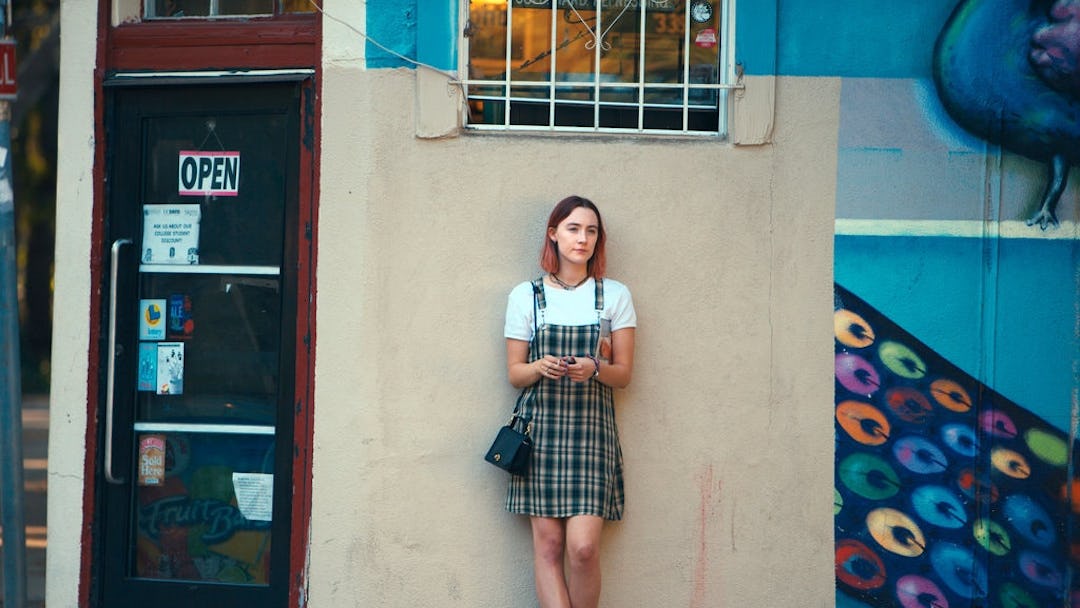There’s a whole country of people who long to live in California, and all Christine (Saoirse Ronan) wants is to get out. She’ll tell you she’s not really there anyway; she was born and raised in Sacramento, and “it’s the Midwest of California,” so now that she’s entering her last year of high school and looking at colleges, “I wanna go where the culture is, like New York. Or at least Connecticut or New Hampshire.”
Lady Bird, which tracks her on that quest – and through a senior year that includes awakenings about sex, friendship, family, and being a generally decent human being – is the solo feature directorial debut of Greta Gerwig. She also wrote, but does not appear, and while literally any movie is immediately improved by a Greta Gerwig performance, she marches in as a fully-formed filmmaker, stylish and intoxicating. Her film has a beautifully fluid sense of montage, full of scenes that are short and snappy without feeling shallow (the typically delightful Jon Brion score keeps things moving as well). She’s got a terrific eye – the compositions are striking, intermingling symmetry with unexpected angles – and ear, her dialogue capturing the very specific rhythms and wit of teenagers. She’ll catch up with her characters in the middle of something, an odd conversation or a funny bit, in a way that underscores lives lived outside the frame. (First exchange of a random scene: “It’s normal not to touch a penis.” “I have to go to class.”)
And when Christine (who goes by “Lady Bird”) falls hard for the leading man in the inter-school production of Merrily We Roll Along, Gerwig’s delicate direction beautifully captures the warm glow of a new romance, how it seems at that age (and not long after) that the whole world has changed – and how, when it ends, it feels like the whole world has ended. (She does a cut from the end of that relationship to a Dave Matthews Band listening session, and it’s one of the funniest edits in recent memory.)
Eventually she moves on, to Kyle (Timothée Chalamet, also in this fall’s Call Me By Your Name), who plays in a band, smokes a lot of cigarettes, and fancies himself a bit of an intellectual. Lady Bird goes along with it as best she can, because she likes him so much, but Gerwig catches her little accidental smirks when he mouths inanities about chips in our brains, or says things like “I’m trying as much as possible not to participate in our economy.” This guy is so well-observed, a very specific kind of Zinn-reading faux-deep thinker; we’ve all dated this guy, or known him, or maybe even, for a time (gulp) been him.
Ronan is one of our most dazzling young actors, and there’s a fascinating fusion of styles happening here; the character is played with the credibility and genuineness she brings to all her work, but she’s also to some extent playing Gerwig, and her line readings are embedded with the distinctive flavor of their creator. She gets at the mixture of brassiness and immaturity at the heart of some of Gerwig’s best performances, but it’s no imitation either – the character is unquestionably hers, and the performance is one of her finest. (Watch for her little sigh after Kyle notes that he wishes she were flirting with him. It says more about desire and longing than most monologues.)
Gerwig surrounds her with about the best supporting cast you can hope for, led by Laurie Metcalf and Tracy Letts as her parents, wearing their marriage like a comfy old bathrobe. It’s frankly Metcalf’s movie as much as Ronan’s; like a lot of 17-year-old women and their mothers, they have a relationship that’s terse and tempestuous (“You both have such strong personalities,” her dad puts it, delicately). But Gerwig’s script is also wise to the ways in which they’re playing predetermined roles for each other, pushing buttons and putting up walls because that’s who they are, and what they’re expected to be.
Ultimately, the film vibrates most in those moments when humanity and vulnerability shatter the barriers we’ve created between ourselves; those moments happen fast (as in life), and some filmmakers couldn’t navigate those hairpin turns, but Gerwig never wavers. There’s an indelible scene between Lady Bird and her ex, long after they’ve broken up, when they both realize exactly who they need each other to be; the other comes late in the film, and it features Metcalf all alone, and I won’t say more than that, except that it’s miraculous.
Gerwig’s real achievement here is crafting a work that understands the complexity of the parental relationship – just how goddamn hard it is to raise kids, and not in the obvious, dumb ways movies so often fixate on. Lady Bird’s mom is a bad parent, yes, but not a bad person, and most people have a moment in their young lives when they finally understand that distinction, and appreciate it. Mom doesn’t mean to be so prickly and beholden; it’s just who she is.
She tries to lay it out for her daughter: “I want you to be the very best version of yourself that you can be.” The girl replies, “What if this is the best version?” And there’s a little pause after that’s so well-timed, and just filled to the brim by the way these two look at, and feel about, each other. It’s a perfect moment, both sad and funny. Lady Bird is full of them.
“Lady Bird” is out Friday in limited release.
